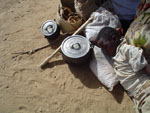
Both the Sudan Tribune and Inner City News reported Sunday that the state of South Darfur plans to relocate the residents of Kalma camp to two new camps in the area of Beliel, southeast of the state capital Nyala. There are reportedly over 50,000 internally displaced people, or IDPs, living in the camp which has seen increased violence in recent weeks, mostly tied to the involvement of local IDPs in the Doha peace process. According to local officials, the new camps will each accommodate between 25 and 30 thousand people and will be equipped with all the basic services.
While at first glance this plan seems to be a rather innocuous development, it once again points to a larger trend about which people on the ground (including aid staff and locals alike) appear concerned. As I wrote in another blog post last week, now that the international community has its attention focused on the North-South negotiations, the Government of Sudan seems determined to solve the Darfur “problem” on its own terms. While the specific details differ depending on the source, most everyone agrees that the government’s solution will undoubtedly include camp closures and some degree of forced movement that is tied to the forfeiture of land rights (about which the displaced will likely be unaware). Reports that Kalma camp may be closed should therefore serve as a red flag to the distracted international community.
When Inner City Press requested more information on the planned relocation, an OCHA spokesman replied:
“[The] Humanitarian Team (UN and NGOs) in South Darfur will meet to discuss issue of proposed new site, as there are various implications. The U.N. cannot support any movement of IDPs that is not voluntary or otherwise appropriate. Until such a time as a suitable location and facilities are established, and decision reached on movements in full consultation with IDP community of the camp, IDPs in Kalma camp should continue to have access to humanitarian assistance as required.”
This is all fine and good but it does lead one to wonder: if the government decides to move forward with the forced relocation of camp residents, or of anyone else for that matter, what exactly does the U.N. plan to do to stop it? I know from firsthand experience that the U.N. faces incredible constraints in Darfur, including an inability to do honest reporting for fear of being expelled. While this fear is understandable, it also means that U.N. actors on the ground are (ironically) the least likely to prevent a forced relocation, should the government choose to orchestrate a full-scale campaign. So where does that leave the displaced people of Darfur? The international community should give that some thought before settling on its priorities for the pre-referendum period.
Photo: Child under tree at Kalma camp in Darfur (Doug Mercado)

